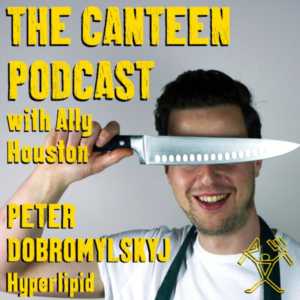Uncategorized
Peter Dobromylskyj – Hyperlipid
 Peter Dobromylskyj is a veterinary anaesthetist and nutrition blogger, whose blog Hyperlipid is renowned in the low carb world.
Peter Dobromylskyj is a veterinary anaesthetist and nutrition blogger, whose blog Hyperlipid is renowned in the low carb world.
Buy our cookbook Low Carb On A Budget from our website if you live in the UK – bit.ly/ordercookbook – or from Amazon or Barnes & Noble if you live outside of Europe.
We talk about:
- The “Optimal Diet”
- The carnivore diet
- The legendary “Proton” series of posts from Hyperlipid
- Species appropriate diets for humans and other animals
- And more!
Peter can be found at:
Blog – http://high-fat-nutrition.blogspot.com/
Ally can be found at:
Twitter – https://twitter.com/paleocanteen
Twitter – https://twitter.com/paleoally
YouTube – https://www.youtube.com/c/AllyHouston
Buy our cookbook Low Carb On A Budget from our website if you live in the UK – bit.ly/ordercookbook – or from Amazon or Barnes & Noble if you live outside of Europe.
Podcast: Play in new window | Download

Regarding the Cancer Rates in the Optimal Diaters in Poland, one thing to consider:
Kwasniewski’s diet has been most popular in Silesia – the coal industry region with a very harmful living and working environment. How do the cancer rates compare to the population in that particular region vs the whole country?
A good question Tomasz. Epidemiology always hard to break down!
Well, this was a real pleasure. Thanks to you for getting Peter on, thanks to peter for taking the time, and thanks to George Henderson, whose twitter post alerted me to this interview.
It was my pleasure Bob, thanks for listening!
Wonderful conversation. Thank you. I love his curious mind.
Thank you for listening Kelly.
I’ve been through the Protons thread twice and its fascinating – been reading hyperlipid since 2009 when I took up an lchf diet… Protons is hard work and would love it if Peter could write a succinct and structured summary of findings…maybe he thinks it is too soon to draw conclusions. enjoyed this podcast, thanks.
Thanks Richard. Yes, a summary would be nice. I wonder if Peter feels like it’s summarised already, or that something might be lost if it was shortened. He certainly hinted at the fact that so many of these posts were written years ago, it’s almost as if someone else wrote them.
00:00:00 – 00:10:00: background introductions exchange. Peter’s professions / background as anaesthesia. Peter’s Atkins induction history ~ early 2000s. General climate on low carb / carnivore community = slightly “biased” towards confirmatory finality(s)?
00:11:00 – 00:21:00: ethical discussions amidst animal welfare. “Animals should live a good life and a good death.” .
00:22:00: 00:25:00: recalling back Atkins’ stance on nutrition. His history, and scrutiny on his protocols amongst competitive opinions.
00:26:50 – 00:38:00: Yudkin’s comments on Atkins. Challenges amidst maintaining very low carb ratios without protein. Atkins stance = “Pro sat fat, but not pro ketones”. Thoughts on how nutrition affects behaviours / psychology mental health. Emily Deans(?).- Psychology Today article – Netherlands – double blind N3 omega PUFA trial intakes = violence behaviour possible correlations study.
00:41:00 – 00:48:00: Thoughts exchanges on insulin approx 15 mins. Insulin correlation with cancer = seemed convincing. Weight loss = “best surrogate” for 24 hours insulin levels. Pancreatic cancer = immune system impairments correlations? Loss of smell as side effect of low carbohydrate?
00:51:00 – 00:56:00: Carnivore experiences difficulties = keeping protein low is difficult. Evolution wise = it’d be counterproductive if primal man weren’t able finding an animal fatty enough for sustainable feeding. Protein intakes and muscle mass and growth hormone dilemma.
00:57:00 – 01:16:00: Thoughts on fasting, longevity & protein intakes. Evolution theory wise suggest more muscle mass = earlier mortality for the immediate passing of genes as quick as possible. Metformin, Glucosamine = “longevity tweaks” – for rodents. Peter’s current eating. Coffee – possible adverse effects on over dependence. Peter’s early experiences on endurance exercise amidst Atkins induction.
01:19:00 – 01:30:00: The “Protons” view of nutrition. Is it a concept? Difficult to describe / summarise for lay audience. But seemingly fixates surrounding ROS / reactive oxygen species, its origins, and how it is confounded by possible incoming substrate pathways – glucose or fatty acids? 01:26:00 Comment / early influence from Stephan Guyenet ~ “Insulin resistance is an ANTIOXIDANT mechanism in cells”, in other words, insulin resistance might be a feature, not a dysfunction to protect itself from accepting too much incoming energy to the cell? [complex Biochemistry elaboration inbetween NADH vs FADH pathways, brain energy metabolism, electron transport chain].
01:30:00 – 01:38:00: The problem of N6 PUFA its relation to ROS. How it impacts and disrupts the natural “physiological” insulin “resistance” in the cell [complex Biochemistry elaboration hydrgogen / electron exchanges amidst beta oxidation pathways].
01:39:00 – 01:46:30: On peter’s stance as vet = should dogs be fed raw meats? Reflecting on prior studying experience on H.pylori infection and correlation with dogs’ contraction of diarrhoea. Statins affect metabolic markers?
01:47:00 – 01:59:00: [Exchange of thoughts on vet nutrition, current recommendations, scrutiny, etc] HLA-B27 genetic marker discussion ~ history and its risk relevance to immunology / autoimmune disease (and Ankylosis Spondylitis) that may trigger severe food immunological reactions (most commonly suspected from dietary starches). Whether this HLA-B27 test appears in 24andME® remains uncertain.
02:00:00 – 02:10:00 end: Question from “Tucker”: For those still on SAD / standard American diet what can you change? Peter: remove refined foods, PUFA N6. More interesting questions raised from Peter: 1) with the PUFA N6’s adverse effect; from preventing insulin resistance signals convincingly / strong enough of a signal ~ “Does it matter then ~ if Insulin levels are rock bottom?” 2) “If you’re on ketogenic diet, would PUFA N6 intakes makes you obese?”
—
Amends welcome. Please contribute further in the comments.
AW™ / nutritional-humility.me
00:00:00 – 00:10:00: background introductions exchange. Peter’s professions / background as anaesthesia. Peter’s Atkins induction history ~ early 2000s. General climate on low carb / carnivore community = slightly “biased” towards confirmatory finality(s)?
00:11:00 – 00:21:00: ethical discussions amidst animal welfare. “Animals should live a good life and a good death.” .
00:22:00: 00:25:00: recalling back Atkins’ stance on nutrition. His history, and scrutiny on his protocols amongst competitive opinions.
00:26:50 – 00:38:00: Yudkin’s comments on Atkins. Challenges amidst maintaining very low carb ratios without protein. Atkins stance = “Pro sat fat, but not pro ketones”. Thoughts on how nutrition affects behaviours / psychology mental health. Emily Deans(?).- Psychology Today article – Netherlands – double blind N3 omega PUFA trial intakes = violence behaviour possible correlations study.
00:41:00 – 00:48:00: Thoughts exchanges on insulin approx 15 mins. Insulin correlation with cancer = seemed convincing. Weight loss = “best surrogate” for 24 hours insulin levels. Pancreatic cancer = immune system impairments correlations? Loss of smell as side effect of low carbohydrate?
00:51:00 – 00:56:00: Carnivore experiences difficulties = keeping protein low is difficult. Evolution wise = it’d be counterproductive if primal man weren’t able finding an animal fatty enough for sustainable feeding. Protein intakes and muscle mass and growth hormone dilemma.
00:57:00 – 01:16:00: Thoughts on fasting, longevity & protein intakes. Evolution theory wise suggest more muscle mass = earlier mortality for the immediate passing of genes as quick as possible. Metformin, Glucosamine = “longevity tweaks” – for rodents. Peter’s current eating. Coffee – possible adverse effects on over dependence. Peter’s early experiences on endurance exercise amidst Atkins induction.
01:19:00 – 01:30:00: The “Protons” view of nutrition. Is it a concept? Difficult to describe / summarise for lay audience. But seemingly fixates surrounding ROS / reactive oxygen species, its origins, and how it is confounded by possible incoming substrate pathways – glucose or fatty acids? 01:26:00 Comment / early influence from Stephan Guyenet ~ “Insulin resistance is an ANTIOXIDANT mechanism in cells”, in other words, insulin resistance might be a feature, not a dysfunction to protect itself from accepting too much incoming energy to the cell? [complex Biochemistry elaboration inbetween NADH vs FADH pathways, brain energy metabolism, electron transport chain].
01:30:00 – 01:38:00: The problem of N6 PUFA its relation to ROS. How it impacts and disrupts the natural “physiological” insulin “resistance” in the cell [complex Biochemistry elaboration hydrgogen / electron exchanges amidst beta oxidation pathways].
01:39:00 – 01:46:30: On peter’s stance as vet = should dogs be fed raw meats? Reflecting on prior studying experience on H.pylori infection and correlation with dogs’ contraction of diarrhoea. Statins affect metabolic markers?
01:47:00 – 01:59:00: [Exchange of thoughts on vet nutrition, current recommendations, scrutiny, etc]
HLA-B27 genetic marker discussion ~ history and its risk relevance to immunology / autoimmune disease (and Ankylosis Spondylitis) that may trigger severe food immunological reactions (most commonly suspected from dietary starches). Whether this HLA-B27 test appears in 24andME® remains uncertain.
02:00:00 – 02:10:00 end: Question from “Tucker”: For those still on SAD / standard American diet what can you change? Peter: remove refined foods, PUFA N6. More interesting questions raised from Peter: 1) with the PUFA N6’s adverse effect; from preventing insulin resistance signals convincingly / strong enough of a signal ~ “Does it matter then ~ if Insulin levels are rock bottom?” 2) “If you’re on ketogenic diet, would PUFA N6 intakes makes you obese?”
—
Amends welcome. Please contribute further in the comments.
AW™ / nutritional-humility.me
I love Peter’s blog. the interview was wonderful
Thanks Duncan!
Who else would you like to hear on the podcast?